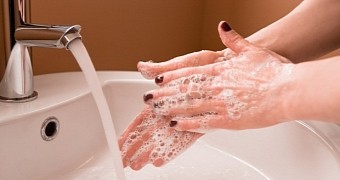The people who make and market them would have us believe they are the ultimate line of defense against nasty germs that would love nothing more than set up camp on our precious skin but, as it turns out, anti-bacterial soaps are just as effective at killing bugs as regular ones.
In a series of trials, a team of researchers showed that, although advertised as the safer alternative, anti-bacterial soaps actually dispose of about as many germs as regular ones. To make a difference, one would have to wash their hands for several hours straight, evidence indicates.
How the experiments played out
To test whether buying anti-bacterial soaps instead of regular ones really is all that it's cut out to be, the researchers behind this study invested in some bars themselves and compared their germ-fighting abilities to those of perfectly ordinary varieties.
In an experiment, they grew as many as 20 different dangerous bacteria strains in Petri dishes and then exposed them either to anti-bacterial or regular soap samples for 20 seconds, which is how much time the World Health Organization says we should take to wash our hands.
For the sake of accuracy, the specialists even heated the bacteria drenched in soap to 22 to 40 degrees Celsius (72 to 104 degrees Fahrenheit). This was done to simulate the effects of having somebody wash their hands with warm or maybe quite hot water.
Once the bacteria were done with this unexpected bath, the researchers counted them. They found that, rather than prove a worthy warrior against germs of all kinds, the anti-bacterial soap had actually killed about as many bacteria as its perfectly ordinary kin, Live Science informs.
Then, in another experiment, the research team had volunteers wash their hands with anti-bacterial or regular soaps. Yet again, there was no difference in the number of germs killed by the two types of soap, the specialists explain in a paper in the Journal of Antimicrobial Chemotherapy.
By the looks of it, the only way that anti-bacterial soaps can kill more germs than regular ones is if people wash their hands for about 9 hours straight. It is only then that their anti-bacterial properties kick in and the fancy soaps do their job to slay nearly all germs in sight.
The study focused on specific soaps
The anti-bacterial soaps that were used in these experiments all contained a chemical compound called triclosan. This chemical, described as an anti-bacterial and anti-fungal agent, is added not just to soaps but also to detergents, even toys and surgical cleaning treatments.
The trouble is that, as shown by these experiments, its presence in soaps is not a guarantee of a germs-free life. Rather, it looks like the compound needs time to actually kill bacteria, which means that simply washing one's hands with it doesn't really do anything.
“This study shows that presence of antiseptic ingredients (in this case, triclosan) in soap does not always guarantee higher anti-microbial efficacy during hand washing,” study senior author Min-Suk Rhee explained in an interview.
“If the manufacturer would like to advertise the antiseptic efficacy of their products, they should supply scientific evidence to support the claims,” the researcher went on to say.
Apart from many soap and detergent brands, triclosan is added to toothpaste, mouthwash and shampoo. Studies carried out over the years have found evidence that long-term exposure to this compound can cause cancer, reduced fertility and developmental issues.
Back in 2013, the US Food and Drug Administration announced plans to carry out an investigation of its own to assess whether triclosan does in fact pose a threat to public health and should be banned. This investigation is still ongoing.
“FDA is engaged in an ongoing scientific and regulatory review of this ingredient. FDA does not have sufficient safety evidence to recommend changing consumer use of products that contain triclosan at this time,” health officials wrote in a recent update on the matter at hand.

 14 DAY TRIAL //
14 DAY TRIAL //